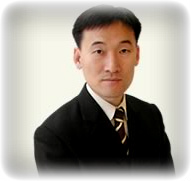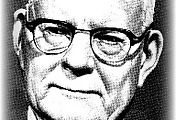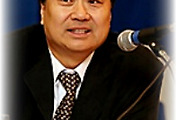Interview
with Prominent Scholar (Prof. Dr. Lim, Doo-Hum) Adult & Higher Education

Date:
Sept. 26 2008
Time:
04:00 PM ~ 04:40 PM
Place:
Teleconference (Office of Dr. Lim)
Background
On fall 2008 semester, the class of HRE
580 Disciplined Inquiry in Human Resource Education (lectured by Dr. Andrea
Elligner) requires an interview with a prominent scholar in HRD academic field.
The purposes of
this interview are identifying emerging fields in HRD, catching up with the
academic trends in HRD, and acquire invaluable insights from prominent
scholars.
Interview
Questions
Five semi-structured interview questions
are used to fulfill the interview objectives.
- Please tell
me about your program of research (research agenda). What are some of the
current problems/gaps or challenges in the literature that your research
helps to address?
- Please help
me to better understand the differences between the mission and focus of a
research intensive/extensive university. How does this mission and focus
differ from non-research universities?
- Please
share your perceptions about what constitutes a quality piece of research.
- Please
share your perspectives about compelling research topics in HRD. What
topics are being given attention or should be given attention?
- Please
share your tips you may have for developing a research proposal.
Interviewee
Selection
Firstly, the research investigated
prominent scholars in “HRD for Engineering leadership, transition or
socialization” since his intrinsic interest. Then, he found out Dr. Russell
Korte. Dr. Korte has strong specialties on case study of socialization of newly
hired engineers with qualitative approach. His articles were published on the
AHRD and he had conducted National Science Fund (NSF) projects which were
focused on developing engineering competencies. However, Dr. Korte was not available
and he connected the research with Dr. Susan Linnemeyer, a director of Special
Programs in College of Engineering in UIUC. But she resigned for her inadequate
qualification for interview questions. Then she recommended Dr. Bruce
Litchfield and Dr. Scott Johnson. Dr. Litchfield was a specialist for “Creativity
development for engineers,” but he resigned for his inadequate qualification
for HRD field. Dr. Johnson might be the best candidate for this interview. But
he was not available either for his busy schedule.
The researcher fell into a dilemma in
selecting a prominent scholar who had a strong specialty in HRD for
Engineering. He reflected his interviewee selection criteria and he found out
the scope of his criteria were too specific on engineering. Then, he recalled a
HRD scholar who he had met him at the Academy of HRD conference on 2008 at
Florida, whose name was Dr. Baek-kyu (Brain) Joo, a Korean American Scholar. He
researched about “Creativity development” and he was very interested in
researching about the developing creativity for Scientists & Engineers.
However, he also resigned for his lack of research outperformance and
introduced the research another Korean American HRD Scholar, Dr. Doo-Hun Lim, a
professor of Adult and Higher Education at University of Oklahoma.
Dr.
Lim was quite proper to take an interview, since he has a strong specialty in
HRD and Technology. Also, he had published good articles in International HRD
with his strong background about HRD practices in high tech fields in Korea. In
addition, he got his Ph.D. at UIUC HRE and he was quite open minded to the
researcher. So, the research contacted to Dr. Lim to take an interview.
Interview
Process
The interview with Dr. Lim was conducted
through telephone conference. Before taking an interview with him, the
researcher sent an E-mail to explain in purpose and got a reply of permission.
On Sept. 26, the researcher called Dr. Lim’s office at University of Oklahoma
and it was lasted for 40 minutes (4:00 ~ 4:40 PM). The interview was conducted
in Korean since the interviewee was preferable to transfer deeper insights in a
more favorable language.
Interview
Results
As described before, there were five
interview questions, and the researched asked it to Dr. Lim sequentially. The
interview results are as bellows.
Question
1:
Please tell me about your program of research (research agenda). What are some
of the current problems/gaps or challenges in the literature that your research
helps to address?
Answers:
-
I’m
conducting a comparable study of work ethics and work-family conflict. The
research is quite focused on comparing the work ethics and family relationships
of employees in public and corporate organizations between the U.S. and Korea. I
have published several articles about the work ethics topic already. I almost
completed a data mining of the second research topic about work-family
relationshipand will publish outputs soon.
-
In
many literatures of HRD, researchers give a great attention to studying ‘influencing
factors of family or family relationship to performance.’ But little attention
has been made for international comparison in different ethical or cultural
environment. In addition, many HRD research is quite focusing on “Organization
level” but not much about “Corporate or Society level.” So, I hope to address
this blinded spot in HRD by comparing two different cultural settings of work
ethics and work-family relationships.
Question
2:
Please help me to better understand the differences between the mission and
focus of a research intensive/extensive university. How does this mission and
focus differ from non-research universities?
Answers:
-
The
two biggest different things between research and non-research universities are
“Infra-structure for research” and “Compensation.”
-
Research
oriented universities provide a good infrastructure for faculties. For example,
“Mentoring program for faculty development” and “Information Session for
Faculty” are commonly provided in research universities. However, non-research
universities could not provide these faculty development programs for it’s
focusing on teaching, not researching. A case of a new faculty is quite typical
in non-research university’s under qualified infrastructure. As an instance, the
new faculty member should make a 3~4 classes in a week and he may be suffered
from the lack of time or resources to proceed his research.
-
Second
one is the compensation. Research oriented universities usually has weigh a
faculty’s research performance than any others. Research fund raising
activities, publications or academic collaborations are highly encouraged in
research universities and become a critical factor for faculty compensation
decision (merit based system), but little systemic supports are given to
faculties in teaching schools.
Questions
3:
Please share your perceptions about what constitutes a quality piece of
research.
Answer:
-
Three
things can affect overall quality of research in HRD: 1) Research topic
selection and setting up good research questions, 2) Submergence of a field and
3) Reflections in everyday lives.
1)
Research
topic selection and setting up good research questions.
-
First
of all, when a researcher selects a research topic s/he should consider
research demands in a field. Intrinsic motivation is a good one but without
demand for the topic, the quality of research must be limited. In this sense, “timing”
of the research topic is an important factor which a researcher should be
considerate.
-
Secondly,
setting up key questions is another very important thing. Even in a general
topic research, when a researcher can find an “interesting or impactful key
question,” it can improve the quality of research.
2)
Submergence
of a field
-
“A
Rome was not built in a day.” Quality research can be produced only if a
researcher has enough knowledge and experiences in a field. Recently, many
researches seem very superficial and do not address the profound or root level factors
to explain an HR phenomena. A researcher should experience a lot of “Trial-and-Error”
to catch a “deep meaning” of a research with rigorous research questions.
3) Reflections
in everyday common lives
- Good research
questions can be induced from how and what the researcher thinks in everyday
lives. Observing a mental process (what, when, where changes a human behavior)
in common life can give insightful findings. So, a research should have a “habit”
of questioningin daliy lives.
In
depth Question 1: You mentioned about ‘reflection’ and you have researched
about it for many years. What factors and how they affects human reflection?
Answer: Do you know the anecdote of “Monkey
Trap?” A hunter place a banana in a big jar with a small hall which is fit to
monkey’s hand. Only if a monkey releases a banana, then it can be released from
the trap. This tale explains the importance of human “reflection” process.
Human can think which means one can reflect on an event and then is aware of the
genuine reason or cause. Through this deep thinking process, one can change
his/her behavior or habit. This is the reflection and change. By reflecting a
serious experience and awakening to a profound “value” in it one can change
oneself. There are two reflection factors: external and internal reflection.
When severe environmental changes are given to a person or organization, this
can give a chance to start “reflection” process. We call this is a “push
reflection.” However, an individual or an organization can realized the
severity of a change by “reflection,” and change or develop “self-concept.” In
your case, by providing “sensitivity training” which were quite popular during
1960~70s, engineering freshmen’s perception can be changed and improve their
performance. Finding yourself is a key for reflection and change.
Questions
4: Please
share your perspectives about compelling research topics in HRD. What topics
are being given attention or should be given attention?
Answer:
-
In
my opinion, there are four compelling research topics in HRD: 1) Intuition
study, 2) Interdisciplinary research, 3) Technology in HRD and 4) Executive
coaching.
-
Especially,
as you already saw the arguments on AHRD conference on 2008, HRD needs more
interdisciplinary and practice oriented researches. Journals of AHRD (HRDQ,
HRDR, International HRD) concerns too much about “HRD” itself, but various and
complex problems and issues are combined in HRD. So, researcher should think
and study “various field such as management, psychology, neurology, sociology,
anthropology and many others.” For example, babyboomer retirement is a hot
topic in this country, but not many researches are addressing this topic. In
sum, HRD researcher should have “interdisciplinary” and “open mind” attitude to
do a research.
-
Concerning
to executive coaching, even though it is quite overlapped with management study,
we HRD researchers can give a different perspective or value for it. So, there
are lots of “uncultivated or underdeveloped topics” for us if we can open our
mind.
Questions
5: Please
share your tips you may have for developing a research proposal.
Answer:
-
As
already mentioned before, good research proposal is started with selecting a
compelling research topic and setting up good questions.
-
There
are two principles to develop a good research proposal: 1) Doable and 2)
Manageable.
1)
Doable:
It means a researcher can complete a research in an effective manner. The most
important thing is setting up a right “Scope.” Be specific on a topic.
2)
Manageable:
Similar to doable a researcher should consider cost to effectiveness. By doing
various literature review a researcher can develop an integrative perspective
and by developing a deep thinking s/he can find “manageable” researches.
In
depth Question 2: As a Korean Scholar in the States, do you have any suggestion
for international Ph.D. students to be a good researcher?
-
It’s
quite tough question. My recommendation for international Ph.D. level
researchers are 1) find a niche and 2) have your own color.
1)
As
an international scholar in the U.S., it’s not easy to be a mainstreamer.
However, we can provide a different perspective to our field. For example, my
research in Korea can give another understanding in a same research topic. So,
an international scholar should try to find a “niche” which are not able to be
reproductive.
2)
Having
a “Color” is another good one for international scholar. You have a good sense
in technology or engineering and this may be helpful for you to have your own “color.”
Closing
After finishing an interview with Dr.
Lim, the researcher gave him a great thank and would send a small but
meaningful gift for him. The gift is a book “Disruptive class” by Chris
Christensen, a Harvard Business School Professor. To increase the validity, the
researcher would summarize the script and send it to Dr. Lim to review it.
Feedback on Transcription.
The feedback on transcription were received from Dr. Lim on Sept. 30 2008 and the material was revised as his comments.
'Meditation on Korean Leadership > 2.Leader to Leader' 카테고리의 다른 글
| Zombie Employee...!! (0) | 2009.02.02 |
|---|---|
| 데밍이 말한 경영에서의 7가지 치명적 "독" (0) | 2008.11.09 |
| 간디의 일곱가지 치명적인 죄..!! (0) | 2008.11.09 |
| 과학기술계 리더 인터뷰 #2, 공공기술연구회 이사장 (0) | 2008.08.14 |
| 과학기술계 리더 인터뷰 #1, KAIST 생명과학과 유욱준 교수님 (0) | 2008.08.13 |



댓글